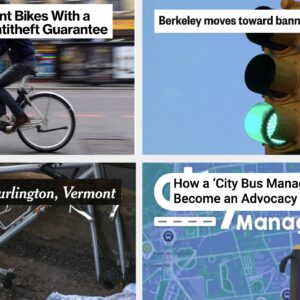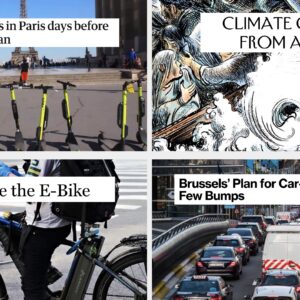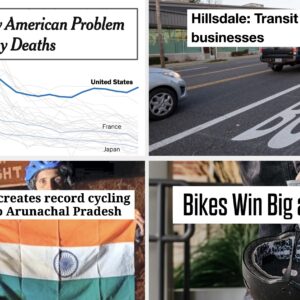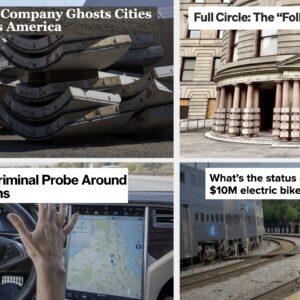Here’s the news that caught our eye this week:
– Commuting—in car traffic at least—is the number one thing that makes U.S. Americans unhappy, according to one study.
– New Jersey, with a pedestrian fatality rate twice that of the nation as a whole, has a new law requiring that you come to a complete stop for people crossing the street, rather than just yielding; also the responsibility for any crashes is now placed on the person driving.
– A new study shows that the bulk of Oregon’s greenhouse gas emissions come not from cars and home heating, but from manufacturing and freight.
– The New York state supreme court has ruled that driving with a suspended license can now be considered in some cases when determining criminal negligence in a traffic death. This wasn’t possible previously.
– In Charlotte, North Carolina, a new light rail line is proving almost too successful for its budget.
– In Pittsburgh, a new ordinance requires that new developments include bicycle parking facilities.
– In Seattle, the new mayor is going to bat for including transit on a major bridge project that is already far along in the planning process, and the polls are backing him up.
– Amtrak ridership is up—way up—over 2009 levels.
– As US driving costs rise, auto sales are still down; but many more cars are being sold in China and India.
– An interesting look at the current state of Turkey’s bicycle industry and infrastructure.
– Thinking about painting your own bike lanes or traffic markings? A lawyer points out the potential personal liability issues and suggests advocacy instead.
– According to one analysis, the entire population of the U.S. could live comfortably, if densely, in the state of New Hampshire (our parking lots, however, would require a larger chunk of New England).
– How do you build a transportation system from scratch? Here’s a cool look at how various paths and modes built up during the very early days in San Francisco.
– Until recently, private cars were very rare in China, but it’s hard to imagine that reality now. One of the first U.S. American tourists to visit the country when it started granting individual visas in the 1980s was a photographer with an interest in transportation. He’s scanned and posted a fascinating series of photos, showing bicycles, trolleys, trains, and urban foot traffic.
– And finally, two videos, both by CNN: Pedestrian struggles in Cairo and solutions in London.







Thanks for reading.
BikePortland has served this community with independent community journalism since 2005. We rely on subscriptions from readers like you to survive. Your financial support is vital in keeping this valuable resource alive and well.
Please subscribe today to strengthen and expand our work.
you couldn’t pay me to live in new hampshire/new england. listen to those horrible accents? no thanks.
Good to see the trains (Amtrak) making a comeback. They really are underrated – a very relaxing, reasonable, and efficient way to travel. If my parents didn’t live in Baltimore, I’d swear off domestic airlines all together.
huey lewis:
Ha, you must be a closet Yankee’s fan. 😉
At this point I’d rather almost listen to a New England accent than the drawn-out “laid back” Cali accent that dominates this area. Ah, home.
Now I’m hankerin’ for some Dunkin’ Donuts.
I would stop walking while a motorist does California or Idaho stop forcing them to stop legally and completely.
the photo grist uses to illustrate guerrilla bike lanes (“portland, where else?”) is a PBoT facility.
Sure, we could all fit in New Hampshire, but the infrastructure required to support that would be impossible – in fact, New York City’s infrastructure barely supports it, and it only represents about 4% of the US population.
It’s a neat thought exercise, though. Massive density doesn’t actually work, but we’re only now just starting to realize it (most people aren’t even aware of it) – in 50 years something like NYC will no longer be possible due to the expense of maintaining the resource flows and the cost of infrastructure replacement.
Did you really say U.S. Americans?
Matt, you say that density, such as that in NYC will no longer be possible in 50 years. How about backing that up with some research and data instead of spouting your opinion as fact?
matt is right- NY will fail because they spent their money for maintaining infrastrucure on bike paths (greenways)
Yes, U.S. Americans. As opposed to South Americans, Central Americans, or Canadians.